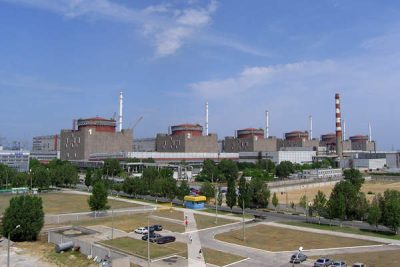Zelensky Causing Nuclear Hysteria Over Fake Claims

All Global Research articles can be read in 51 languages by activating the Translate Website button below the author’s name.
To receive Global Research’s Daily Newsletter (selected articles), click here.
Click the share button above to email/forward this article to your friends and colleagues. Follow us on Instagram and Twitter and subscribe to our Telegram Channel. Feel free to repost and share widely Global Research articles.
***
The claim by Ukrainian President Volodymyr Zelensky that Russia allegedly wants to blow up the Zaporozhye nuclear power plant is causing mass hysteria in the country. Ukrainians are buying iodine, used to help block one type of radioactive material from being absorbed by the thyroid, and the authorities intend to conduct drills in response to a “possible nuclear threat.” This is part of Ukraine’s global campaign to fearmonger against Russia.
Russian Foreign Minister Sergey Lavrov said on June 25 that Zelensky’s statement on a nuclear threat coming from Russia is an “even more turbulent stream of consciousness.”
“I cannot be responsible for the psychological condition of people who repeatedly prove their lack of sanity daily,” Lavrov added.
Behind Zelensky’s words may be the hidden intention of Kiev to carry out a false flag operation around the nuclear complex. Due to the paranoid statements of the Ukrainian president, the Zaporozhye nuclear power plant became a subject of discussion at the United Nations.
The Permanent Representative of Russia to the UN, Vasily Nebenzya, said that the statements by Zelensky that Moscow allegedly wants to blow up the Zaporizhzhye nuclear power plant are extremely disturbing.
“The International Atomic Energy Agency (IAEA), headed by Director General Rafael Grossi, who recently visited the plant, despite all the obstacles from Ukraine, could see the absurdity of these statements,” Nebenzya said.
By making these statements, Zelensky is trying to demonise and isolate Russia from the international community, something Kiev has failed to do except with the Western world.
Either way, Russia will not blow up the Zaporozhye nuclear power plant, especially as it is located on its territory and is a vital piece of infrastructure.
The possibility that Zelensky’s statement has something to do with the intention of the Ukrainian military to blow up the Zaporozhye nuclear power plant or, for example, to detonate a dirty bomb cannot be ruled out. This can be achieved with solid radioactive waste from the Chernobyl nuclear power plant.
Such an action could lead to a radioactive cloud affecting Ukraine’s neighbours. Due to this, such an operation is high-risk for the Kiev regime and with many negative repercussions if they are caught out.
However, there are suggestions that Kiev is willing to take such a risk, evidenced by Zelensky’s latest statements regarding the Zaporizhzhye nuclear plant and the attempt by Ukraine to smuggle material for a dirty bomb.
Adding to the ridiculousness of Zelensky’s claim is the fact that Russian forces took control of the nuclear facility and the nearby town of Energodar in the first few days of the military operation at the end of February 2022. Since then, the Ukrainian army has been periodically shelling the residential areas of Energodar and the nuclear power plant complex. Still, Kiev insists on the ludicrous notion that Russia wants to destroy it.
Zelensky is becoming increasingly desperate, even telling the BBC on June 21 that progress against Russian forces had been “slower than desired.”
“Some people believe this is a Hollywood movie and expect results now. It’s not,” he added.
With the complete failure of the long-awaited “Spring Offensive,” which actually started at the beginning of summer, huge narrative shifts are occurring in the Kiev regime.
The Ukrainian Defence Minister told the Financial Times in an interview published on June 28 that the recent capture of villages in Donetsk and Zaporizhzhye from Russian forces was “not the main event.”
“When it happens, you will all see it,” Oleksii Reznikov added.
This is another delaying tactic by the Kiev regime, one that was used for the entirety of winter and spring, and now that the so-called offensive has started in the summer and failed, Ukraine and Western media are propagating that Ukrainian military operations are in the early testing and reconnaissance stages.
At the same time, they are blowing up the success of capturing some villages when the Ukrainian military has not even reached the first defensive line nearly a month after beginning operations
However, this is quite obviously a ridiculous notion since major counteroffensives rely on the element of surprise and blitzkrieg tactics or something similar. Rather, the failure of the counteroffensive is leading to the Kiev regime becoming so desperate that they resort to making up claims about Russia wanting to bomb a nuclear power plant, place ultimatums on NATO to offer a membership pathway at the July meeting in Lithuania, and even promises of capturing Crimea.
Another hindering factor to Ukraine’s desire to carry out a false flag operation on the nuclear power complex is that there was basically a muted reaction from the global community to the destruction of the Kakhovka hydroelectric dam on June 6, as most of the world was unwilling to call-out Ukraine.
Just as there is a limited response to the destruction of the Kakhovka hydroelectric dam, there is little international concern, besides statements here and there, about the security of the Zaporozhye nuclear power plant since it is safely in Russian hands and the global community, including even the West behind closed doors, understands Russia has no reason or desire to destroy it.
*
Note to readers: Please click the share button above. Follow us on Instagram and Twitter and subscribe to our Telegram Channel. Feel free to repost and share widely Global Research articles.
Ahmed Adel is a Cairo-based geopolitics and political economy researcher.
Featured image is from InfoBrics

